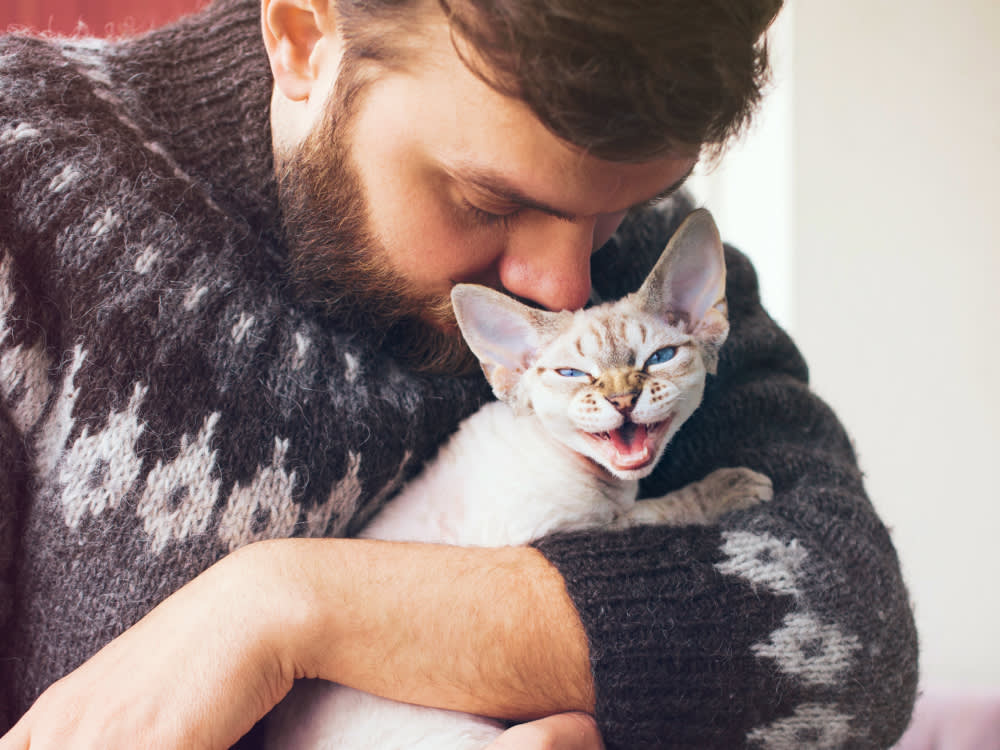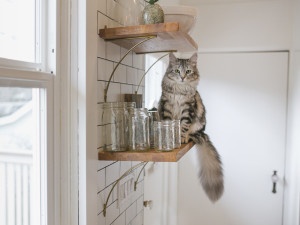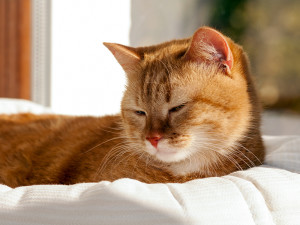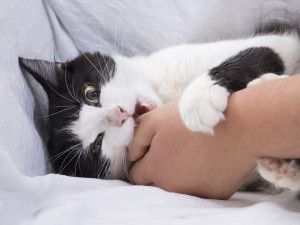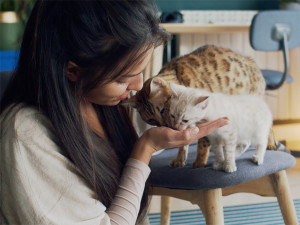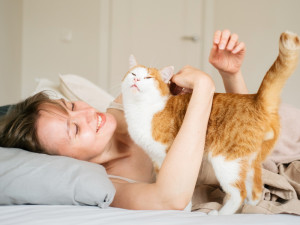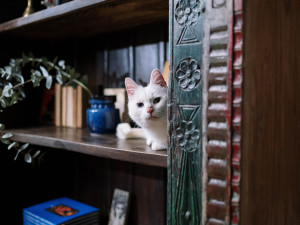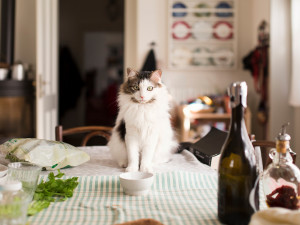Why Does My Cat Meow So Much? Reasons Your Cat Meows Excessively
How to decode your cat’s love language when one meow has many meanings.
In This Article:
Common Reasons Cats Meow Excessively How to Manage Excessive Meowing Is My Cat’s Meowing Normal? When Excessive Meowing Is Cause for Concern Frequently Asked Questions
Your cat knows one word, and they repeat it over and over. And over. Cats meow to communicate, get your attention, make a demand, and express an opinion — so it should come as no surprise that living with a cat often means a never-ending chorus of meows. But how can we tell them apart, and what if we just need them to pipe down a little?
Sometimes, the message is clear, or it’s a call to action: They’re happy that you’re home from work, they’re stuck in the closet, they’re hangry… or, it could be a learned behavior. In other words, your cat might have discovered that, the more persistently they meow, the more likely you are to stop scrolling Instagram and pet them or share your fish taco.
Let’s dive into all the reasons your cat is meowing to figure out how to decode their messages, better understand their needs, and hey, maybe even get a moment of silence for yourself.
Common reasons why cats meow excessively
A cat may meow repeatedly to communicate, get your attention, or signal that they’re experiencing stress or suffering from an underlying medical issue. The definition of excessive meowing, however, can depend on who’s on the receiving end of the repeated chatter, as well as what’s considered normal for your cat’s particular breed.
How much do you spend on your pet per year?
“Some cat breeds are known for being talkative — for example, Siamese,” says Mikel Delgado, a certified applied animal behaviorist and cat behavior consultant at Feline Mindsopens in new tab. “One person’s ‘excessive’ meowing is another person’s delightfully chatty.”
Regardless of breed, if your cat’s kicked the meowing up a few (or a few dozen) notches, context clues and body language can go a long way in figuring out the cause.
Communicating their needs
Cats are pretty savvy communicators, and those meows are their way of chatting it up with humans. Whether it’s a plaintive plea for a refill on the kibble, gentle reminder about that empty water dish, or subtle nudge to clean out the litter box, those meows can be messages from your cat about what they need. And it’s not just about the basics like food, water, and bathroom breaks — sometimes they’re just looking for a bit of entertainment and playtime to shake off the boredom blues.
Attention-seeking behavior
Ever notice how your kitty suddenly becomes the center of attention when they start meowing up a storm? That’s because cats are masters of pulling focus. They can elicit a soft, melodic meow or a full-on operatic performance — either way, those vocalizations almost always get you to notice them.
“When they meow at us, we often respond — by talking back, petting them, or giving them treats. When we do this, we are reinforcing or rewarding the meowing behavior,” Dr. Delgado says. “That makes the meowing more likely to happen in the future when our cats want something from us.”
If you want the meowing to stop, as hard as it is, these cries for attention should be ignored, not reinforced.
Stress or anxiety
Changes, no matter how small, can send our feline friends into a tailspin of stress and anxiety. Whether it's the arrival of a new family member, a change in their environment, or even just a rearrangement of the furniture, cats can be sensitive souls when it comes to disruptions in their routine. Just like us, cats need a little extra TLC during times of upheaval, so a reassuring pat or some quality cuddle time can work wonders in calming their nerves.
Underlying medical issues
More frequent meowing, changes to the tone, or a perceived urgency could be a sign of pain or another medical issue. For example, older cats with feline cognitive dysfunction (dementia) meow more than usual when they are confused or disoriented. Female cats in heat can meow endlessly, as can unaltered males when they sense a potential mate nearby.
“Cats may meow when they are experiencing certain medical issues, including deafness and hyperthyroidism, or when you’re gone if they have separation anxiety,” Dr. Delgado explains. “If your cat is meowing non-stop, or is meowing more than they used to, that’s a good reason to check in with your veterinarian.”
How to manage excessive meowing
If you’re feeling ready for a break from the constant symphony of meows, there are things you can do to get a reprieve and make sure your cat is good to go, too. Dr. Delgado suggests:
Ruling out medical issues with a veterinarian: Before addressing behavioral aspects, it’s crucial to ensure there are no underlying medical conditions contributing to excessive meowing, which a vet can help identify.
Increasing exercise and mental stimulation via interactive play: Engaging your cat in regular interactive play sessions can help alleviate boredom and excess energy, reducing the urge to meow incessantly (puzzle toys can work wonders with this).
Using clicker training: Clicker training techniques can reinforce quiet behavior, teaching your cat that silence brings rewards.
Working with a behavior professional: For persistent meowing issues, seeking guidance from a behaviorist can provide tailored strategies and support to address the root cause.
Is my cat’s meowing normal?
The truth is, some cats are chatterboxes, while others embrace a mysterious and quiet persona and reserve their vocals for special occasions. It all boils down to your cat’s unique personality, breed tendencies, and their way of communicating with you.
“Some meowing is perfectly normal, depending on breed and how the behavior is reinforced,” Dr. Delgado explains. “I always recommend reaching out to your vet and/or working with a behaviorist if your cat’s meowing is bothersome to you, or your cat seems to be otherwise stressed.”
When excessive meowing is cause for concern
When your cat cranks up the meowing volume to an 11, it might be time to pause and check in on their wellbeing. Excessive meowing can sometimes signal that your feline is trying to tell you something important. If you notice they are belting out non-stop meows, especially when it’s paired with behaviors like lethargy or other unusual symptoms, it could be their way of sending up a flare for attention.
Other signs of distress to look out for include changes in appetite, hiding more than usual, excessive grooming, and avoiding interaction with you or other pets in the household. These behaviors can indicate that something is bothering your cat, and this is when it’s time to call your vet.
So, the next time your cat starts serenading you with a chorus of meows, remember that they’re just trying to tell you something. Whether it’s a plea for attention, a sign of discomfort, or simply a way to express their feline opinions, understanding their meows can deepen your bond.
FAQs (People also ask):
What does it mean when a cat meows a lot?
Excessive meowing in cats can signal various needs or desires. It could indicate hunger, thirst, boredom, loneliness, or even a medical issue. Understanding the context and any additional behaviors can help uncover the reason behind your cat’s frequent meowing. If the behavior persists or is accompanied by other concerning symptoms, consult with a veto rule out any underlying health issues.
Why does my older cat meow so much?
Increased vocalization in older cats can be attributed to several factors. As cats age, they may experience cognitive decline — this can lead to confusion or anxiety, which can manifest as excessive meowing. Older cats are also more prone to medical conditions, such as hyperthyroidism, hypertension, or arthritis, which can cause discomfort and prompt vocalization.
Why does my cat meow so much when I leave?
Cats may vocalize to express their discomfort or to seek reassurance in the absence of their pet parents. Providing environmental enrichment, such as interactive toys, and gradually acclimating your cat to being alone can help alleviate separation-related meowing. If the behavior persists, consult with a veterinarian or animal behaviorist.
